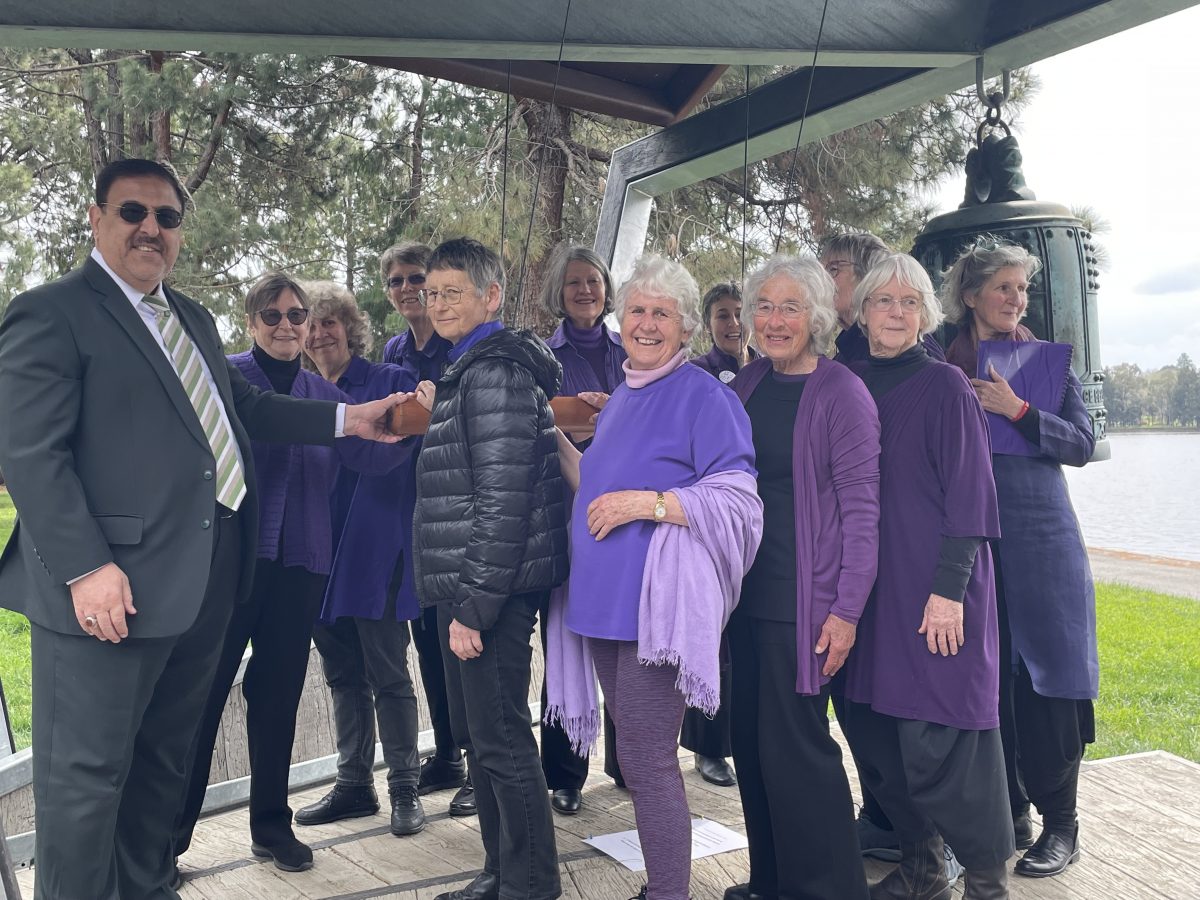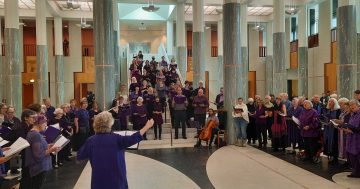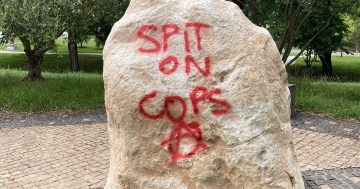
Iraqi ambassador Dr Basim al-Tumna and A Chorus of Women ring the Nara Peace Park bell. Photo: Genevieve Jacobs.
Almost 20 years ago, 150 women slipped anonymously into Parliament House on a secret mission.
The occasion was prime minister John Howard’s announcement that Australia would join the invasion of Iraq.
“Being women of this city, we knew the rules, unlike the protestors outside,” recalled Glenda Cloughley. “We went through security in one or twos and we didn’t stand around looking like a choir. And we began singing, and there were 150 of us.”
The singers, gathered hastily from networks across the city, raised their voices in lament for the women, the children, the old and all who would suffer from the coming war.
It was a masterstroke that led evening news bulletins, and became the genesis of A Chorus of Women, who this week received the Chief Minister’s Rotary Peace Prize at the Peace Bell.
Two decades on, many still remember that songful act of sabotage.
“We discovered that we had sung a song that was already in people’s hearts, like the longing for peace always is,” Glenda said.
The annual event at Nara Peace Park includes a large representation from the diplomatic community. UN representative Damian Cardona Onses read a message from UN Secretary General Antonio Guterres, describing peace as “a noble and necessary pursuit and the only pathway to a better, fair world for all people”.
“Yet, in too many places, in too many contexts, we are failing the cause of peace,” he said.
The theme of this year’s International Peace Day ceremonies is racism and the Secretary General’s message urged people to “tear down the structures that sustain racism, lift up human rights movements everywhere and to … reaffirm the bonds of solidarity we share as human beings”.
Japanese ambassador Shingo Yamagami said the ceremony had been made even more poignant by the outbreak of war in the Ukraine this year.
“The tragedy of Hiroshima and Nagasaki has been brought into sharp focus by events in Ukraine and the almost cavalier way in which threats of nuclear war have been bandied about by aggressors,” he said.
“It seems that now, more than any other time in the recent past, the global community must act to ensure that the tragedy that befell Hiroshima and Nagasaki, the hundreds of thousands of deaths resulting from the bombs themselves and their lingering radiation are never, ever, repeated.”
The cause of peace and nuclear disarmament remains significant for Rotary, in line with the UN’s sustainable development goals for peace and conflict resolution.
Speaking on behalf of the District 9705 Governor, area governor and Rotarian Lynne Duckham said Rotarians around the world were active in the peace movement, including serving as civil society observers for UN nuclear non proliferation meetings.
“Rotary has taken a stand seeking the abolition of nuclear weapons worldwide, as all the evidence points to this being the only reliable way to mitigate that catastrophic threat to our planet,” she said.
Rotary peace bells and monuments have been installed around the world and the first Rotary peace community was declared in Wagga. There are now 58 peace communities in 17 countries worldwide.
Lynne said that Rotary’s Action Group on Peace has endorsed the treaty on the prohibition of nuclear weapons and Rotary clubs internationally are being asked to follow suit.
Member for Canberra Alicia Payne, speaking on behalf of Prime Minister Anthony Albanese, said that throughout history small acts of courage had created ripples of hope and changed the world for the better.
“In this interconnected age a threat to one is a threat to all. We state clearly and unequivocally our commitment to seek the peace and security of a world without nuclear weapons,” she said. “We can collectively eliminate this danger that recognises no borders and deliver a safer world for future generations.”
A Chorus of Women and former Peace Prize recipient Fred Smith sang Bougainville, written during his time on the Australian peacekeeping and diplomacy mission. They were joined ringing the peace bell by Iraqi ambassador Professor Dr Basim Hattab al-Tumna.
“We sing for our sisters and the children of the world and we sing for peace,” Glenda said in her acceptance speech.
“We sing for the children of our granddaughters, our great-grandchildren, and for a peaceful future for all humanity.”













